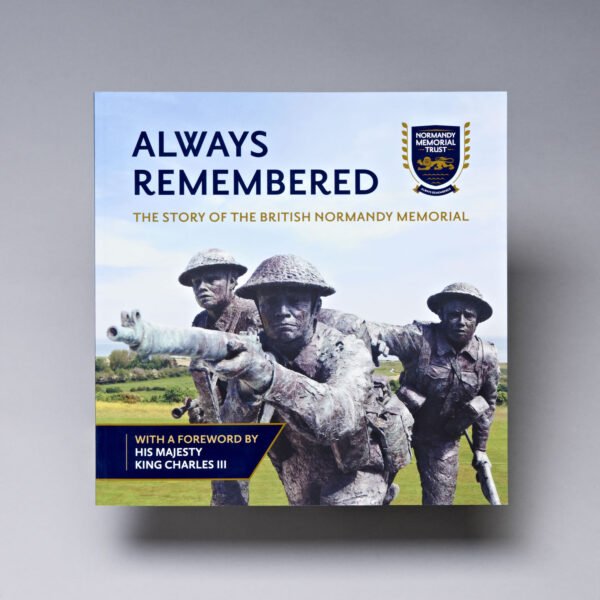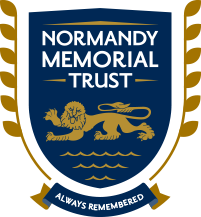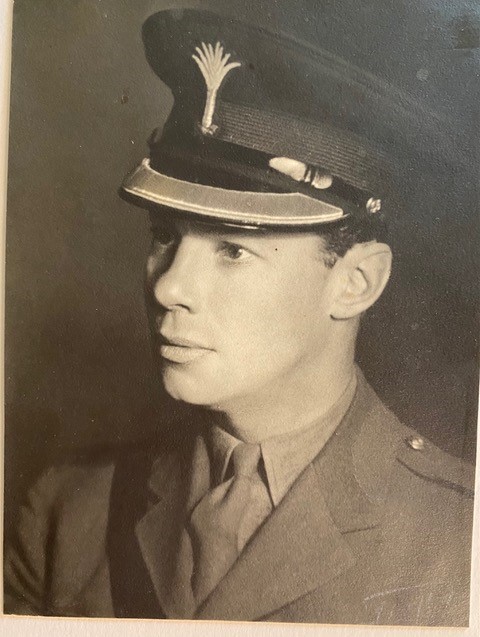
Johnny Fass #1
This story and photos are shared by the Trust with kind permission from Michael Fass, Johnny Fass' son. The story is taken from the memoire Michael wrote about his father’s journey into the Battle for Normandy, entitled Salute Me When You See Me available at online retailers
After a successful start as a young officer in the pre-war British Army, Johnny Fass became one of the best-known trainers of men in the war-time Household Division. He subsequently achieved success as a junior staff officer before reaching the pinnacle of his career when he joined the staff at COSSAC, the organisation responsible for the planning of Operation Overlord, the D-Day landings in Normandy. Here he found himself working at the highest levels of the politico-military direction of the war in the West.
Sailing for France in June 1944 he was killed in action outside Caen shortly afterwards whilst in command of the First Battalion, Welsh Guards, eight days after I was born.
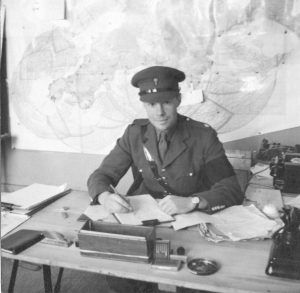
Johnny Fass, when serving as Company Commander in the Training Battalion, Welsh Guards, in Colchester, 1940
At the beginning of WWII, my father attended the first Senior Officers War Course held in 1940, although still a junior. The commandant was a Major General Grassett, an Australian by birth and later Field Marshal Alan Brooke’s Military Secretary. This was to have consequences when General Frederick Morgan was selecting his staff at the formation of COSSAC – Chief of Staff Supreme Allied Command, with as yet no actual commander. COSSAC was to be responsible to Prime Minister Churchill and the Chiefs of Staff for the planning of Operation Overlord, the retaking of Europe.
The planning staff was assembled in the staff canteen at Norfolk House in St James’ Square, London and on its first day at work was addressed by Morgan. Morgan had insisted that there should be an equal number of US and British officers on the staff - 70 of each - and that they should each cut a button off their uniform cuff and exchange it with their opposite number as a sign of the joint enterprise.
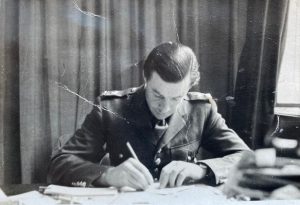
Johnny Fass at his desk in Norfolk House when planning the invasion
My father was appointed GSO1 to Major General P. G. 'Jock' Whitefoord, COSSAC’s first chief of Intelligence. Jock had been a fluent German speaker in WWI and at Dunkirk had helped to save the British Expeditionary Force (BEF) through his interpretation of a map captured from the enemy on May 25th 1940 that showed the way that the allied army would be encircled. The following morning Gort had ordered the general retreat of the BEF to the French coast, much to Churchill’s fury.
My father’s job description was described as Operations & Intelligence Liaison. The former was intended to identify the enemy’s Order of Battle and where its main concentrations were located. For this he would need access to every kind of information, both human via SOE and Axis signals via the Y service of listening posts up and down the East Coast. One of the first actions that the planners took was to place an advertisement in the London Times for anyone with holiday snaps of the Normandy coastline. These were used to make a map that showed every feature of both the beaches and the country inland. My father would have plotted every bridge and crossroads in addition to troop positions.
Alan Brooke, the most respected individual in the British Army, had told Morgan, a fellow officer of the Royal Artillery, ‘Well, there it is. It won’t work but you must bloody well make it!’ Morgan, a shrewd judge of character had stitched together an effective planning team that in 15 short months, prepared for the greatest military operation in history. As Dwight Eisenhower, later appointed to overall command of the joint enterprise, once said ‘Plans are nothing but planning is everything’ and so it was on D-Day 6th of June the following year.
The second part of my father’s job in intelligence liaison required him to work with other Allied forces who would be involved in the invasion. These included the Free French, Dutch and Polish troops who would form part of the invading force. In addition to the role of intelligence gathering that members of De Gaulle’s secret army carried out on French soil, my father made a particular friend of General Maurice Mathenet, De Gaulle’s chief of staff who had attended the Staff College at Camberley in the 1920s and had commanded ‘Mes belles Goumes’ in North Africa. Later - and shortly before the Invasion - my father was sent to Scotland to brief the Polish Army Corps stationed in Edinburgh about their role in the coming battle in which they would go on to serve with great distinction.
By the end of March 1944 the plans for Overlord were now complete and the Cossac planning staff, increased to thousands, became SHAEF (Supreme Headquarters Allied Expeditionary Force). My father, a regular soldier since being commissioned in 1931, begged to be relieved of his staff duties and to be allowed to return to his regiment whose two battalions were included in the Order of Battle for the invasion. At first, Grasett forbade the move as, if captured by the enemy, my father had all the secrets of the advance into Normandy in his head but after much discussion, permission was granted and in May 1944, he rejoined the First Battalion, Welsh Guards with whom he had served as a Company Commander in 1940.
The Battalion would be brigaded with the Third Battalion, Irish Guards and Fifth Battalion of the Coldstream, forming the 32nd Guards Brigade. My father knew these formations well. The Irish Guards were commanded by his good friend, Lt. Col. Joe Vandeleur, who led his battalion at Operation Market Garden and was made famous by the actor Michael Caine who portrayed him in A Bridge Too Far. Joe was later to become my godfather. My father always used to say that Joe had the smartest battalion in the wartime Brigade of Guards and my father had also served with the Coldstream when he had held the position of Brigade Major at 33rd Guards Brigade in 1941.
My father landed on the Norman shore on 21st June 1944 and, like many who crossed the Channel and onto the pontoons and beaches at Arromanches, was astonished to see for the first time the 1400 acres of Mulberry Harbour that he had imagined earlier as a D-Day planner.
The 32nd Guards Brigade went into laager in the orchards of a familiar countryside before its expected deployment as part of the Guards Armoured Division. However, it was detached from the Division a few days later and arrived at the frontline on 28th June, where they were to be deployed in Operation Epsom.
Operation Epsom had begun on 25th June 1944 and was designed to encircle the city of Caen from the west by crossing the Odon River and developing a bridgehead that would trap the enemy forces in the city. The attack would be led by the 15th (Scottish) Division, a Territorial Army formation which had not yet seen action. At first the attack went well and the troops successfully crossed the Odon and expanded their ground. However, the enemy counter-attacked strongly and the 15th were driven backwards and were forced to retreat back across the river line.
In the conditions that followed, the three battalions of 32nd Guards Brigade were deployed to the front in haste to plug the gaps through which the retreating British troops moved. Joe Vandeleur later reported that the conditions were chaotic with dead and dying lying all around them. The Brigade’s orders were to dig in and await events.
On the night of the 30th June, dug into the bocage outside Cheux, the First Battalion, Welsh Guards, suffered its first casualties. As night drew on: 'German shell and mortar fire was stepped up to an almost continual bombardment as heavy and protracted as the previous night’s. Many shells landed on us from the newly arrived Panzer divisions – mostly 88s and 105s – but there were mortar bombs too. There was a particularly spiteful burst of hate. Battalion HQ was being pasted.’ (Sgt Murrell, Intelligence Sergeant, Welsh Guards HQ)
It was at this moment that my father was killed instantly by shell or mortar fire. Murrell again:
‘It was dark but in the area of Battalion HQ it was black. The shells had created a black cloud of dust and pungently acrid smell through which dimly-seen figures ran to and fro and men shouted for stretcher bearers and orders mingled with the cries of the badly hurt men.’
Jock Whitefoord my father’s old boss at COSSAC later wrote an appreciation that appeared in the London Times.
‘The Army has lost a first class officer and leader in Johnny Fass, killed in action in command of his Battalion, and his many friends feel a sad blank without his engaging and attractive personality. Johnny Fass radiated vitality, energy and enthusiasm – for soldiering and for life in general. I only had the privilege of knowing him in wartime, but saw the sterling work he did as an operational staff officer with formations training at home. And subsequently how he filled a very responsible position as a First Grade Staff Officer at Supreme Headquarters with very great success.
Posted to a Staff appointment as a Lieut-Colonel where there was little chance of active service, he begged to go back to command a company in his Regiment. Within a few weeks he had been given command of his Battalion, only to be killed just as he had attained his ambition to see service.
Johnny Fass would have gone far – in the Army or in any sphere of activity where his drive could have made a mark. Johnny was the embodiment of loyalty to his superiors. His personality made him equally popular with colleagues and subordinates and he had the knack of getting the very best out of his staff. Johnny was the happy warrior who lived his life to the full at work and play – and all his friends will sadly miss his laughter and gaiety, whether soldiering, hunting, shooting or just enjoying his company.’
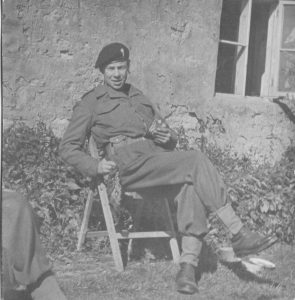
Lt.-Col. John Fass,
Welsh Guards
1911-1944
Hwy clod na hoedl
British Normandy - Additional Information
Serena Fass, Johnny's daughter, wrote about the different ways in which her father has been remembered. You can read it here
FALLEN HEROES
JOHN ERNEST FASS
Army • LIEUTENANT COLONEL
Welsh Guards
1st BattalionDIED | 30 June 1944
AGE | 33
SERVICE NO. | 49851
FALLEN HEROES
JOHN ERNEST FASS
Army • LIEUTENANT COLONEL
Welsh Guards
1st BattalionDIED | 30 June 1944
AGE | 33
SERVICE NO. | 49851




